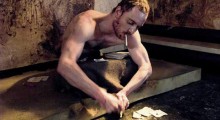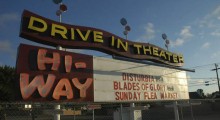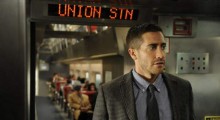Post-Production
Filmmaking - Post-Production
-
Week One at the Edit Center
Over the next six weeks director and Filmmaker contributor Alix Lambert is taking The Edit Center’s course in feature film editing. This is the first of her weekly blogs on her experience. — Editor As a director, I have sat in the editing room for the better part of two decades. My long-time friend and brilliant editor, Hannah Neufeld has talked my off the ledge, dissuaded me from many bad ideas, and brought her own keen eye and internal rhythm to projects that we have worked on together over the years. Other editors (notably David Ritsher) have done the same […]
-
The Cinema is a Train: On Steven McQueen’s Hunger

The Cinema is the Train: Part One Economy of Narrative + Abundance of Truth = Poetry in Cinema In an earlier essay for Filmmaker, I argued that “…cinema’s ‘vocabulary of forms’ is typically under-utilized… While there are any number of cinematic languages that could exist, most of the time films tend to rely heavily upon what we could call the basics of film grammar – shot/counter-shot, close-ups, wide shots, over-the-shoulders and reverses, as well as certain editing paces and conventions of lighting and score,” and went on to praise Enter The Void for its progressive formalism. In keeping with Jean-Luc […]
-
Drive-In Memories

Has there ever been a more American idea than watching movies while sitting in your car? With the temperature hovering over one hundred and the humidity up there to match it, my thoughts go back to my childhood. I grew up in Washington D.C., with this kind of heat every summer. It always meant one thing to me: the drive-in movies. My babysitter used to put me and my two sisters in the back of her pick-up truck and head off to the drive-in. Parked and waiting for the sun to set, tiny fireflies would blink against the darkness. The […]
-
FCP X: More Musings
Since Aesop the fable has been told of the snake or scorpion whose life is being saved by a farmer, turtle, or frog, and who then turns around and inflicts a mortal bite or sting upon its benefactor, perforce sealing its own fate too. The point of the fable is not that snakes or scorpions are evil, but that we each possess an essential nature that drives our behavior, and that others ignore our essential nature at their peril. Hold on to that thought. We’ll come back to it. Since posting my initial notes on FCP X, FIRST MUSINGS, […]
-
FCP X – First Musings
Final Cut Pro X (version 10.0) arrived 8:30 a.m. yesterday morning at the App Store for $299, unleashing torrents of criticism about missing features and a perceived drift from professional product to one that consumers might find friendlier. So far, so good. Let me explain. I, too, had an advance copy (version 9.9.1.77) and wrestled to overcome personal expectations of what a 64-bit next-gen Final Cut should be, given the countless hours of my life spent in front of this revolutionary NLE since it first introduced us to FireWire and DV editing back in 1999. As I wrote last night […]
-
Six Asides on Paranormal Activity 2

Paranormal Activity 2 is not an avant-garde film, but only because no one has argued that it is. 1. The Importance of Framing The difference between commercial culture (pop culture) and the avant-garde is a matter of rhetorical framing. Jean-Luc Godard, for instance, created the conditions for the New Wave not only through his films, but through his words about his films, and about cinema in general. Confrontational, witty, manifesto-like, Godard framed the way people saw his films. Godard was an auteur of language, not just cinema. “A movie should have a beginning, a middle, and an end,” he famously […]
-
Sasha Grey’s Neü Sex

NOTE: Between the time I began reading Neu Sex and beginning this piece and the time I finished it, Sasha Grey publicly announced her official retirement from the adult video industry. If there is a certain bit of schizophrenia that follows below, this might account for that. I’ve noticed a recurring theme in the criticisms that have awaited the publication of porn star/legit actress Sasha Grey’s first book of photography, Neü Sex: this book would never have been published if she wasn’t a hardcore porn performer; she’s whoring her body to gain publicity; there are so many other talented young […]
-
Final Cut Pro and The Road To NAB

Okay, I’m not on the road to NAB… but David Leitner is, and he’ll be filing reports from the conference here at Filmmaker. Look for his pieces beginning tomorrow or Monday. There are other sites to follow as well. Koo will be attending NAB for the first time and posting interviews, write-ups and news over at No Film School. Phillip Bloom will be attending as wIll Vincent Laforet. For many, the big news will be (the rumored) announcement by Apple of the new Final Cut Pro. If you’re not following all the tech blogs, here’s the low-down: at the last […]
-
Human, All Too Human

[Editor’s Note: Spoiler Alert – The ending of Source Code is mentioned in this piece.] “We have only to understand the mirror stage as an identification, in the full sense that analysis gives to the term: namely, the transformation that takes place in the subject when he assumes an image — whose predestination to this phase-effect is sufficiently indicated by the use, in analytic theory, of the ancient term imago. This jubilant assumption of his specular image by the child at the infant stage, still sunk in his motor incapacity and nursling dependence, would seem to exhibit in an exemplary […]
-
Kamal Aljafari’s Port of Memory
There are two barely related images that repeatedly come back to me as I begin to write about Port of Memory (2010) by Kamal Aljafari. One is a house cat languishing on top of a television set, in a family’s living room. The TV is playing a dramatization of the life of Jesus. At first the cat appears inert; the viewer is unsure whether it is an odd piece of bric-a-brac or a living but particularly lethargic mammal. The camera lingers long enough to confirm the latter. The second is a short stretch of Jaffa streets. An Israeli man singing […]
